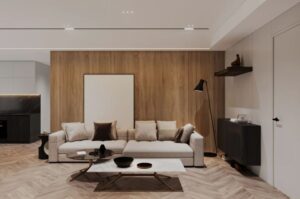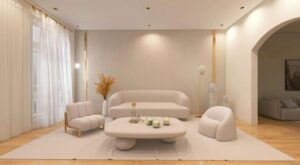When it comes to interior design, the terms modern and contemporary are often used interchangeably yet they represent two very different design philosophies. While both styles favour clean lines and refined aesthetics, their origins, characteristics, and emotional impact vary significantly.
At Oraanj Interiors, we are frequently asked to explain the distinction, particularly by homeowners seeking clarity before renovating or redesigning their homes. Understanding the difference helps ensure your interior reflects not only visual appeal, but also your lifestyle, personality, and architectural setting.
Whether you are refreshing a single room or planning a full home transformation with Interior Design London specialists, knowing these styles will help you make confident, informed choices.

What Is Modern Interior Design?
Modern interior design refers to a specific design movement that emerged in the early to mid-20th century. Influenced by Scandinavian simplicity, German Bauhaus principles, and mid-century modern design, this style was born from a desire to move away from ornate decoration towards clarity, function, and purposeful living.
Rather than following current trends, modern design is rooted in history making it consistent, recognisable, and enduring.
Key Characteristics of Modern Design
Modern interiors typically feature:
-
Clean, straight lines and uncluttered layouts
-
Functional planning with minimal ornamentation
-
Natural materials such as wood, leather, and stone
-
Warm neutral colour palettes including beige, taupe, and earthy browns
-
Furniture with exposed legs and geometric forms
The emphasis is firmly on balance and proportion. Every piece has a reason for existing, and unnecessary decoration is avoided.
Modern interiors feel calm, grounded, and visually ordered — ideal for those who value simplicity without sterility.
From an Interior Design Studio London perspective, modern design works beautifully in apartments, townhouses, and open-plan homes where structure and clarity are essential.
The Philosophy Behind Modern Design
At its core, modern design is guided by the principle of form follows function. This means that furniture, layouts, and architectural features must first serve a practical purpose with beauty emerging naturally from thoughtful execution.
Modern interiors often rely on strong spatial planning and architectural balance rather than decorative excess. Clean walls, defined zones, and natural materials create an atmosphere of quiet confidence.
This is why modern design remains popular decades after its introduction it doesn’t chase trends, it transcends them.

What Is Contemporary Interior Design?
Contemporary interior design is not tied to a specific era. Instead, it reflects the design sensibilities of the present moment. As trends evolve, so does contemporary design.
Unlike modern interiors, which remain consistent, contemporary spaces adapt continuously influenced by technology, sustainability, lifestyle shifts, and global inspiration.
This flexibility makes contemporary design especially appealing to homeowners who enjoy refreshing their interiors over time.
Key Characteristics of Contemporary Design
Contemporary interiors commonly include:
-
A mix of materials such as glass, metal, concrete, timber, and recycled elements
-
Smooth surfaces alongside contrasting textures
-
Neutral bases paired with bold accent colours
-
Curved lines, fluid forms, and sculptural features
-
Open layouts filled with natural light
-
Smart home technology and eco-conscious solutions
Contemporary interiors feel expressive, dynamic, and forward-thinking perfect for those who appreciate design that evolves with modern living.
The role of Interior Architecture becomes particularly important here, as contemporary spaces often rely on structural flow, lighting placement, and spatial transitions rather than decoration alone.
The Philosophy Behind Contemporary Design
Contemporary design reflects how we live today. It responds to changing work patterns, sustainability concerns, and the desire for multifunctional spaces.
Where modern design feels structured and predictable, contemporary design allows experimentation — mixing old and new, smooth and textured, minimal and expressive.
It thrives on contrast and movement, creating interiors that feel current and adaptable rather than fixed.
Modern vs. Contemporary: Side-by-Side Comparison
| Feature | Modern Design | Contemporary Design |
|---|---|---|
| Time Period | Early to mid-20th century | Current and ever-evolving |
| Design Roots | Historical movement | Trend-driven |
| Materials | Natural materials | Mixed and innovative |
| Colour Palette | Warm neutrals | Neutral base with bold accents |
| Shapes | Straight lines, geometry | Curves and variation |
| Atmosphere | Structured and calm | Expressive and fluid |
| Longevity | Timeless | Adaptable and evolving |
While they share visual similarities, their emotional impact is quite different — modern feels grounded, while contemporary feels alive.

Colour and Atmosphere
Colour plays a defining role in both styles.
Modern interiors favour:
-
Earthy neutrals
-
Muted tones
-
Subtle contrast
Contemporary interiors allow more freedom, often introducing:
-
Charcoal or black accents
-
Soft greys with vibrant highlights
-
Occasional statement colours
A professional Colour Consultation helps ensure the palette aligns with your chosen style while maintaining harmony throughout the space.
Furniture Differences
Furniture selection further highlights the contrast between the two styles.
Modern furniture typically features:
-
Clean silhouettes
-
Visible legs
-
Natural upholstery
-
Structured forms
Contemporary furniture, however, often embraces:
-
Curved edges
-
Mixed materials
-
Statement shapes
-
Flexible modular designs
Thoughtful Furniture Selections ensure the furniture not only complements the design language but also supports comfort, circulation, and functionality.
Planning Your Style Visually
Before committing to either style, visual planning is essential. Creating concept visuals helps clarify direction and avoid confusion between modern and contemporary elements.
Professional Mood Board Design allows you to:
-
Compare styles side by side
-
Identify repeating preferences
-
Balance textures and tones
-
Visualise the final outcome
This process often reveals that many homeowners naturally prefer a hybrid approach — blending modern foundations with contemporary accents.
Adding Character Through Feature Elements
Both modern and contemporary interiors benefit from visual focal points.
Carefully designed Feature Walls can include:
-
Architectural panelling
-
Textured finishes
-
Statement materials
-
Subtle lighting enhancements
In modern spaces, feature walls tend to be restrained and tonal. In contemporary interiors, they often become expressive design moments.
Used correctly, feature walls enhance identity without overwhelming the room.
Which One Is Right for Your Home?
Choosing between modern and contemporary interiors often comes down to understanding How to Achieve a Luxury Interior Design Aesthetic in London Homes? Luxury design is not about following trends blindly, but about curating spaces that feel considered, cohesive, and deeply personal.
Choose modern design if you value:
-
Timeless appeal
-
Structured layouts
-
Natural warmth
-
Calm, uncluttered interiors
Choose contemporary design if you enjoy:
-
Trend-forward aesthetics
-
Visual contrast
-
Adaptable interiors
-
Expressive design choices
If you’re unsure, a blended approach often works beautifully modern structure with contemporary detailing.
At Oraanj Interiors, we help clients interpret both styles and tailor them to the architecture, lifestyle, and personality of each home.
Final Thoughts
While modern and contemporary interior design share surface similarities, their foundations are very different. Understanding this distinction allows you to make informed decisions that result in cohesive, meaningful interiors rather than mismatched aesthetics.
Whether your preference is timeless simplicity or evolving modern expression, the key is intentional design as one that supports how you live today and how you’ll live tomorrow.
If you’re ready to redefine your space with clarity and confidence, contact Oraanj Interiors today to book a personalised design consultation with our expert team.
Your ideal interior style is closer than you think, it simply needs the right direction.


